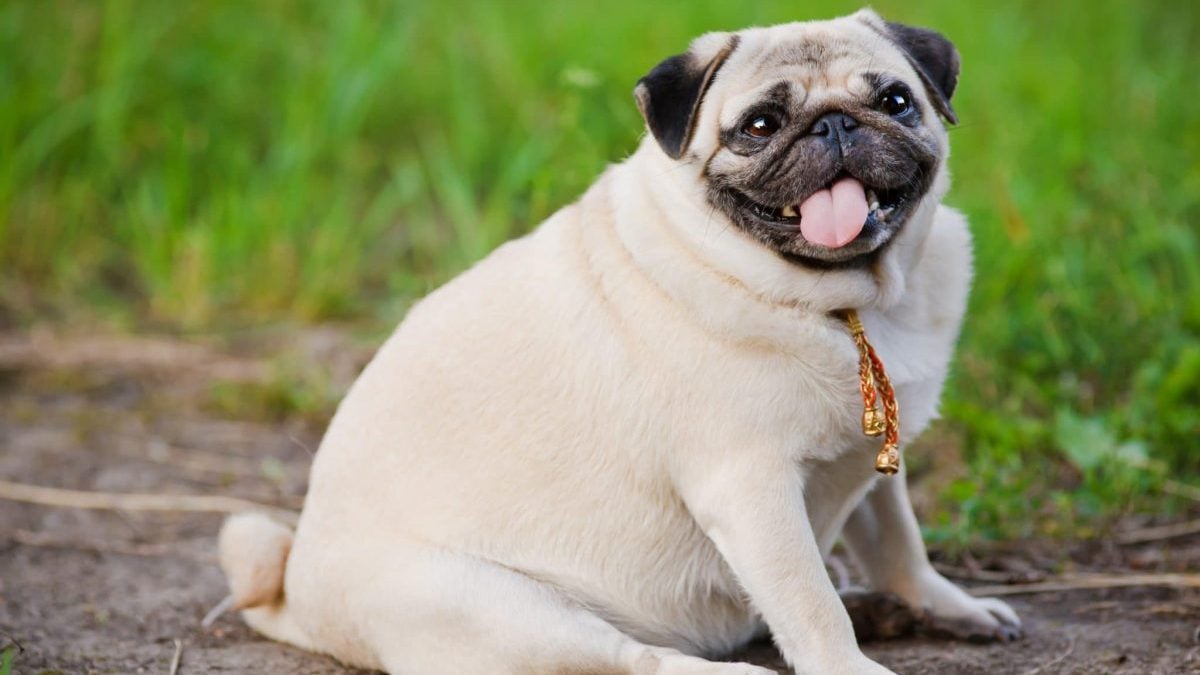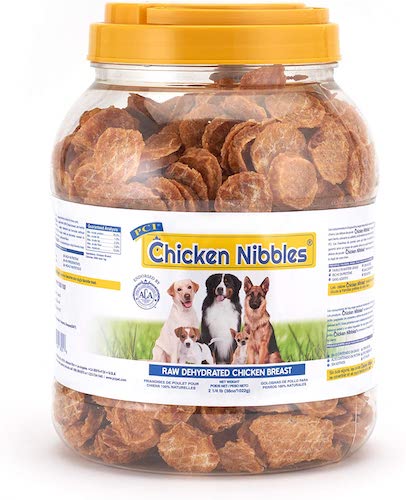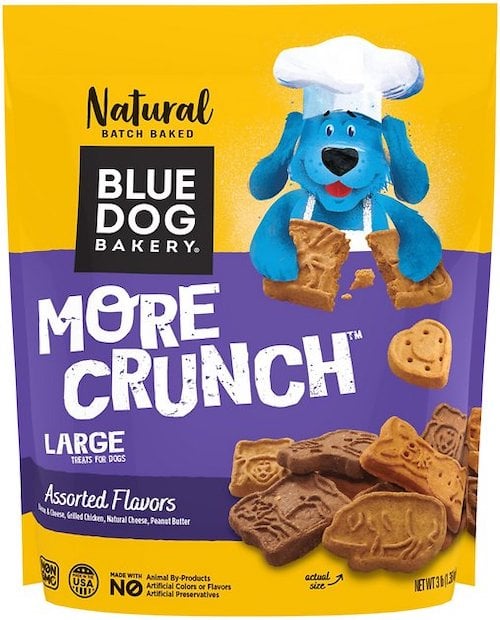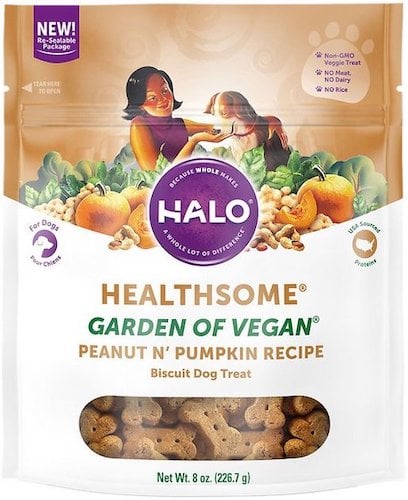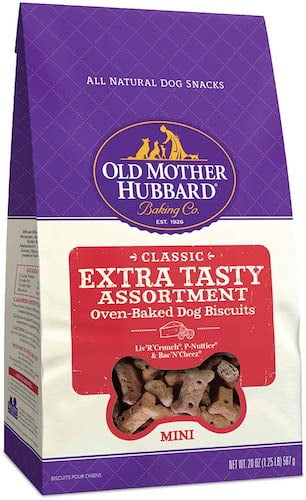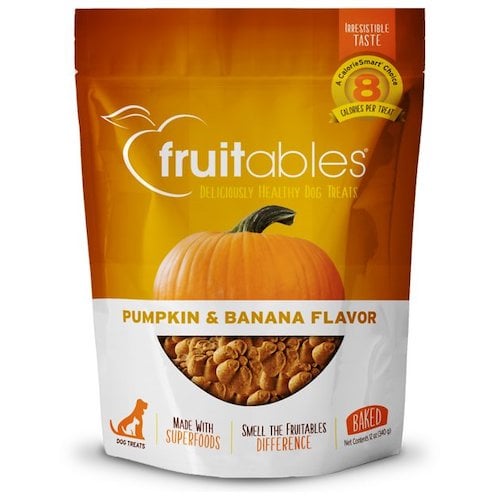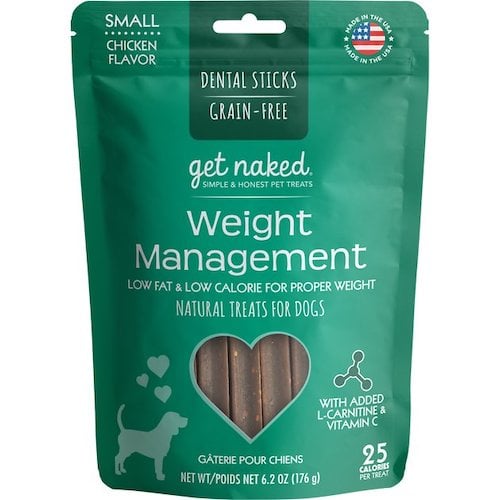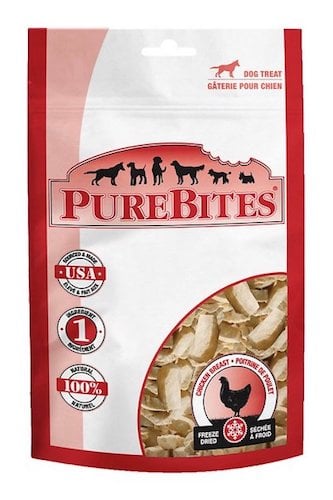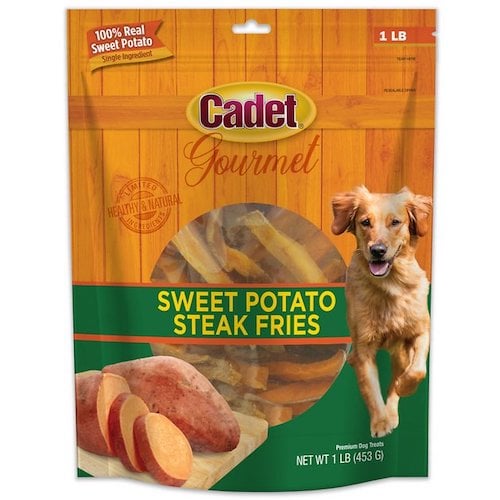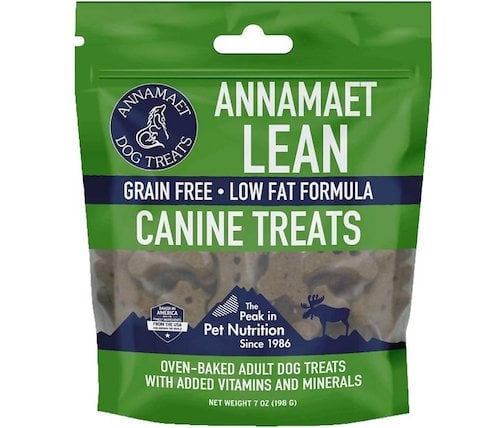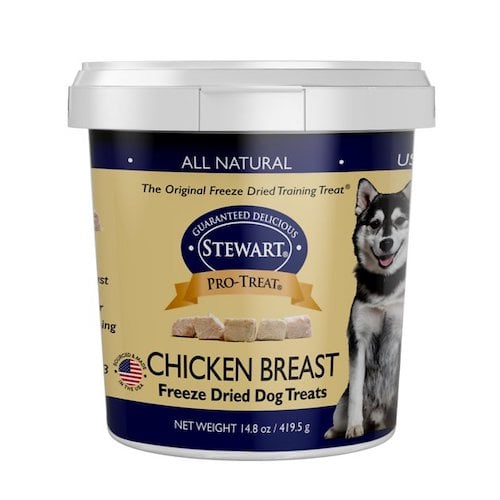- This post contains affiliate links. Read more here.
- Not a substitute for professional veterinary help.
People sometimes love a chunky pet, but when it comes to your dog’s health, canine obesity isn’t cute. According to the VCA, obesity is the most common preventable disease in canines in North America, affecting 25 percent to 30 percent of the general dog population. If your dog could stand to drop a few pounds, consult with your vet and consider switching them to a low-fat diet for dogs. Depending on your pet’s needs, your vet may also advise swapping out your pup’s regular treats for low-fat dog treats, too.
In this article, we’ll take a deeper look at low-fat dog treats, and round up some quality options for your pet.
Are Low-Fat Dog Treats a Healthy Option for Dogs?
Low-fat treats can be a healthy option for dogs but, as is true for any pet food product, it all depends on what’s actually in the treats.
“When removing fat from a product, you do need to watch what else was put in the product to make it palatable,” says Dr. Jim D. Carlson, a holistic veterinarian and owner of Riverside Animal Clinic and Holistic Center.
If a dog treat is low in fat but high in added sugar or unnatural ingredients (such as additives and preservatives), it’s not going to be good for your dog. On the other hand, if it’s full of real, natural ingredients like whole fruits, veggies, and protein, it can be a healthy addition to your dog’s diet.
The American Kennel Club makes the excellent point that when it comes to treats, “Some dogs will be just as happy with fruits or vegetables, like bananas, carrots, green beans, and apple slices.” So, in addition to store-bought dog treats, you can try offering these low-fat whole foods to your pet to help manage fat and calorie intake.
Are Low-Fat Treats Right for My Dog?
So low-fat treats can be a healthy choice for dogs. But are they the right fit for your dog?
If your dog is older, inactive, or carrying a few extra pounds, the answer is likely yes.
“Dogs should use up their energy between meals, but overweight and inactive dogs don’t always metabolize their food before the next meal,” says Carlson. “Dogs who don’t use much energy through the day, such as older, inactive, or overweight dogs who aren’t exercising often, benefit the most from low-fat treats.”
Leaner treats are also a must-have if your vet has already recommended a low-fat diet for your pet.
What Should I Look for When Shopping for Low-Fat Dog Treats?
Looking at ingredients and labels is always important—but again, it’s especially important when shopping for low-fat dog treats. “Low-fat treat labels bear watching more than freeze-dried or limited ingredient treats,” says Carlson, because removing fat from a treat recipe can make them less desirable to dogs.
Some manufacturers will pump their treats full of unhealthy ingredients and additives to better the taste. Ideally, the ingredient list will be made up of a few minimal, healthy items and contain no fillers. (You can read more about how to read a dog food label and decode dog food in our article, “The Truth About Dog Food”).
The 10 Best Low-Fat Dog Treats
Ready to add some low-fat deliciousness to your pet’s diet? Let’s take a look at a few of our top picks for the best low-fat dog treats you can buy.
These Chicken Nibble treats have some of the lowest fat content you’ll see on any label (between 1 percent and 2.8 percent). They’re made from a single, high-quality ingredient—chicken breast—making for a low-fat dog treat that’s high in protein, flavor, and nutritional value.
Does your buddy get bored easily? Then you’re definitely going to want to check out these natural low-fat treats from Blue Dog Bakery. Not only are these treats lean, but with four flavors in every bag (including grilled chicken and peanut butter and molasses), there’s enough variation to keep your dog interested and satisfied.
Packed with a healthy dose of two popular dog food ingredients—peanuts and pumpkin—these grain-free biscuits make for a nutritious, low-fat treat in your dog’s diet. They also come in a sweet potato, carrot, and quinoa cookie.
Shop on Chewy Shop on Amazon Shop on Petco
When it comes to dogs, lean dietary needs and weight management issues often go hand-in-hand. These treats pack a one-two punch thanks to their low-fat and low-calorie content. Plus, the savory flavors (like chicken and cheddar) are sure to be a hit with your pet!
Shop on Chewy Shop on Amazon Shop on Petco
Does your pet have a sweet tooth? Not a problem. These pumpkin- and banana-flavored baked treats are a low-fat snack for your dog’s sweeter side.
Shop on Chewy Shop on Amazon Shop on Petco
Low-fat, low in calories, and high in fiber, these soft dog treats are specifically formulated for weight management. Plus, the added L-Carnitine may help boost your pet’s metabolism, making it easier to maintain a healthy weight.
Shop on Chewy Shop on Amazon Shop on Petco
Made with a single ingredient, these protein-packed low-fat dog treats are rich in natural chicken flavor and just three calories each—simply perfect for dogs who need to lose a little weight.
Shop on Chewy Shop on Amazon Shop on Petco
If you’re looking for a low-fat dog treat that is made with wholesome, natural ingredients, look no further. These sweet potato steak fries are made with 100 percent sweet potato, making them naturally low in fat but rich in essential nutrients.
While these dog treats might not be as low-fat as some of the others on this list, this reduced-fat formula is fortified with a variety of nutrients, vitamins, and minerals to support your dog’s overall health.
Made from 100% pure chicken breast, these low-fat dog treats pack a powerful protein punch. They’re also low in fat and calories. They make excellent training treats but can also be broken up and sprinkled over your dog’s bowl as a food topper.
Shop on Chewy Shop on Amazon Shop on Petco
Always Talk to Your Vet Before Making Changes to Your Dog’s Diet
It’s important to consult your veterinarian before introducing your dog to new foods and treats, or when removing familiar or favorite foods from their diet. Your vet can give you deeper insights into what’s best for your specific pet so you can choose treats that will be the best for their health, weight, and overall well-being.
